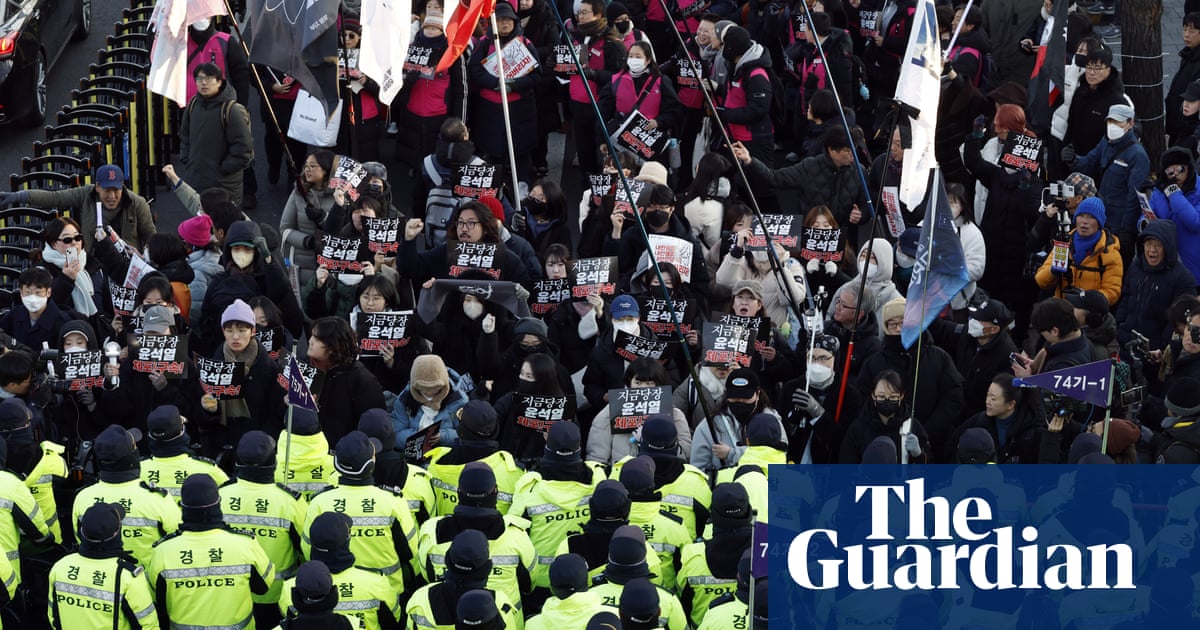South Korean anti-corruption officials attempting to arrest the country’s suspended president, Yoon Suk Yeol, must know by now what he meant by his repeated vows to “fight to the end”.
In the month since his calamitous declaration of martial law, Yoon, along with most of his party, his legal team and, crucially, his security detail, have resisted at every turn attempts to hold him politically and legally accountable.
On Friday, after a tense standoff between anti-corruption officials and security staff assigned to Yoon, South Korea’s gravest political crisis in decades rumbled on, the day closing with another cliffhanger worthy of one of the country’s wildly popular TV dramas.
No one who has followed the turmoil in recent weeks could have guessed how Friday’s visit by 100 officials and police officers would play out. Almost six hours after the attempted arrest began, it ended with Yoon still ensconced in his official residence and not staring at the walls of a cell in Seoul’s detention centre.
Yoon is responding to a political crisis of his making with the same qualities he used to confront striking doctors and resist calls for an investigation into scandals surrounding his wife, Kim Keon Hee – with a defiance that borders on arrogance.
This, after all, is the same man who rejected calls – including those from political allies – to immediately lift martial law after it was imposed late in the evening of 3 December. It was only after opposition MPs grappled with armed troops and scaled walls into the national assembly building to vote down his edict that he finally relented.
Days later, members of Yoon’s conservative People Power party were similarly unyielding, refusing to take part in a first attempt to impeach their conservative figurehead amid chaotic scenes in parliament and leaving the chamber without enough votes to proceed.
A second impeachment attempt succeeded a week later, after a small number of People Power rebels found the courage to vote with the opposition.
Yoon is now channelling his energies into the legal battle. He has refused to submit to questioning over the martial law order – a criminal investigation separate from the impeachment process – while members of the presidential security service have prevented officials from searching his office, citing national security and legal concerns.
It is now up to South Korea’s constitutional court to decide whether to approve Yoon’s impeachment or reinstate him as president. If at least six of its eight justices vote in favour, his obstinacy will have been in vain. Instead, his refusal last month to comply with calls from his own party’s leader to resign could result in the election of a Democratic president to add to the party’s majority in parliament.
Yoon has much to lose by allowing the investigation to run its course unimpeded and risk the ignominy of becoming the first sitting South Korean president to be arrested. Insurrection is one of the few crimes from which the country’s leaders do not have immunity. If found guilty, he could face life imprisonment – or even the death penalty – and join the long list of former South Korean presidents forced to reflect on their actions inside a cell.
The odds are still long on a speedy resolution to a crisis so entrenched it has enabled North Korea to engage in irony-free schadenfreude over the “chaos and paralysis” afflicting its democratic, capitalist neighbour.
But if there is anything positive to be salvaged from the past month it is that, for all the anger and uncertainty, South Korea’s political meltdown has played out without a shot being fired. Many of its citizens will remember a time in their country’s recent history when that was not the case.

